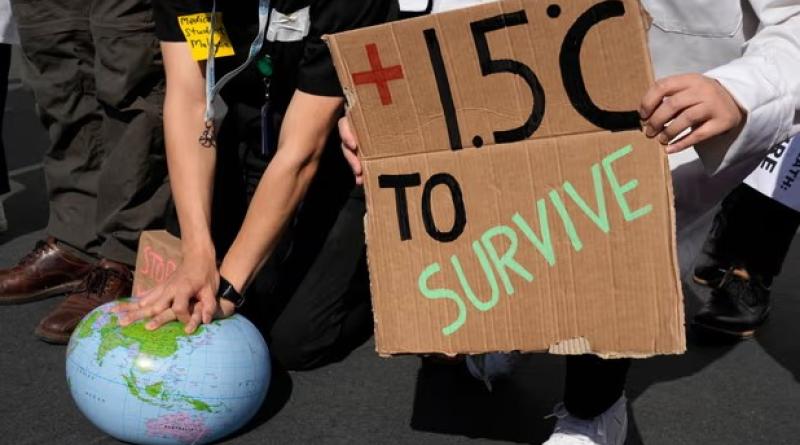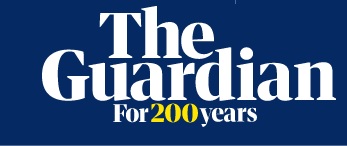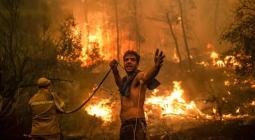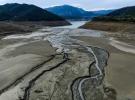Chasm between climate action and scientific reality laid bare in UN stocktake

Rise in global emissions must be halted within two years to avoid the worst – and it can be done, says report
The chasm between the climate action being taken and the emissions cuts required is set out bluntly in the new “global stocktake” report from the UN, produced in collaboration with nations.
As it stands, nations will belch out about 22bn tonnes more carbon dioxide in 2030 than the climate can cope with if the global temperature rise is to be held to 1.5C and the worst impacts of the climate crisis are to be avoided. That 22bn tonnes that must be eliminated is equivalent to the combined emissions of the top five polluters today: China, US, India, Russia and Japan.
Furthermore, the systemic transformation of every aspect of society that the report says is required needs to start kicking in quickly enough to halt the relentless rise of emissions seen since the Industrial Revolution within just two years.
The global stocktake is the most comprehensive analysis of global climate action produced to date and is based on scientific and technical data, as well as consultations with governments, business and civil society. It is a key document that sets out what is required when leaders meet at the UN climate summit Cop28 in November.
The report notes that the 2015 Paris agreement has driven action but says “much more is needed now on all fronts”. Crucially, it says it can be done. “There are now sufficient cost-effective opportunities to address the 2030 emissions gap,” it says.
The “indispensable” actions required are “scaling up renewable energy and phasing out all unabated fossil fuels”, as well as ending the destruction of forests and reducing methane emissions, especially from oil and gas operations.
The report does not shy away from the scale of the challenge. “It is essential to unlock and redeploy trillions of dollars to meet global investment needs,” it says. In other words, it requires reengineering the global financial system. Stopping the fossil fuel investments and vast subsidies that are throwing fuel on the climate fire is critical, it says.
The report acknowledges that “rapid change can be disruptive” but says ensuring climate policies are fair and protect the poor helps to extinguish opposition. Climate policies can also be poverty eradication policies, it says, such as replacing expensive gas power with cheap renewables.
But it is going to be a long haul to re-establish the climate stability that enabled the rise of human civilisation over the last 10,000 years. “Efforts to continue this progress must be sustained over decades,” it says.
The technology and finance to end the climate crisis exist: the greatest barrier is lack of political will. The report says: “Creativity and innovation in policymaking and international cooperation is essential.”
It says: “[Countries] need to put in place durable, long-term reforms that integrate climate change risks into all aspects of planning, decision-making and implementation.” This is currently extremely rare, with even the UK, which casts itself as a climate leader, recently backing new oil and gas licences and drawing up a climate adaptation plan derided as “very weak”.
Big businesses, without which global heating will not be stopped, are called out in the report for their frequent greenwashing. “Rigorous accounting [is] needed to lend credence to their contributions, track progress with environmental integrity and avoid double counting,” it says. On stopping deforestation, it says shifting to sustainable healthy diets is essential, meaning sharp cuts in meat consumption in rich nations.
The report is a technical document written in dry language, but nonetheless describes the world as being in an “era of dramatic and widespread changes”. As the UN secretary general, António Guterres, put it on Wednesday: “Our planet has just endured a season of simmering – the hottest summer on record. Climate breakdown has begun.”
As result, the need to prepare and protect lives and livelihoods from extreme climate impacts is urgent, the report says, but most current efforts are “fragmented and incremental”. Scientists are increasingly concerned that communities are far more vulnerable than expected to the unprecedented heatwaves, wildfires and floods being seen.
The most striking line in the report reads: “There is a rapidly closing window of opportunity to secure a livable and sustainable future for all.” That line is borrowed from a report by the Intergovernmental Panel on Climate Change in March. In the six months since then, carbon emissions have continued and the window has closed a little more.
Photo: Demonstrators pretend to resuscitate Earth during the Cop27 summit last November. Photograph: Peter Dejong/AP







